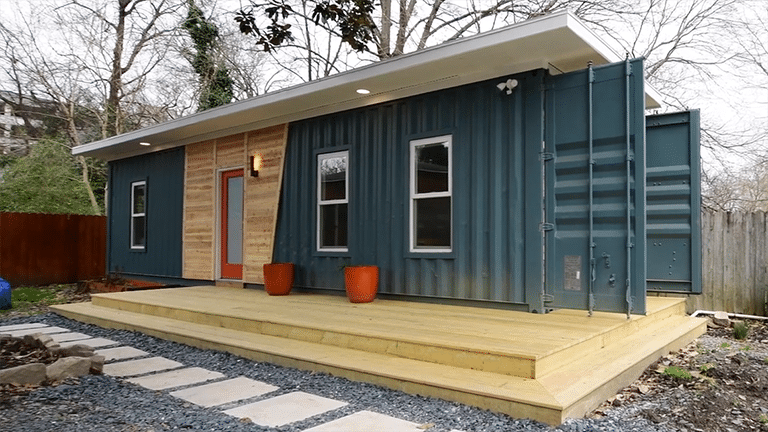Affordable Building, Sustainable Futures: The Modular Construction Company Making Positive Change
Featured Members

Outside view of Mākhers Studio’s accessory dwelling unit design featuring one bedroom and one bathroom. Watch a video tour of the space. Image courtesy of Mākhers Studio.
The growing severity of the housing crisis has led to staggering housing demand worldwide. By 2025, 1.6 billion people are expected to be affected by the global housing shortage. A scalable solution requires a multifaceted approach that both alleviates the housing crisis and helps mitigate climate change. Wanona Satcher, CEO and founder of modular build and design firm Mākhers Studio, shares how her business is increasing housing access and opportunity for underserved communities within Atlanta, Georgia with a lower carbon footprint. Read a summary of the conversation below or click to listen to the full interview between Ms. Satcher and Meredith Sumpter, CEO of the Council for Inclusive Capitalism.
Tell us a bit about Mākhers Studio and how you came up with the idea.
[Satcher] Mākhers Studio is a green design and build company that specializes in modular construction, with a focus on sustainability and reuse to build affordable housing. We aim to understand, redefine, and redevelop the built environment so that it is equitable and accessible, specifically in underserved and under-resourced black and brown communities globally. We want to support and inspire underrepresented people to build the change that they want to see in their community.
As someone who grew up in Atlanta, I am well aware of the lack of access to community resources many people face. My academic background is architecture and city planning, so I’ve always been interested in building cities. I started Māhkers Studio because I’m passionate about using design, construction, and manufacturing to support social change and social justice. We started out with this notion of large-scale design and then shrunk it down to building these modular spaces using shipping containers as our material of choice, because it is an available abundant material, easy to retrofit and recycle. Plus, we can scale and ship these units across the globe.
Even though our focus is affordable housing, we also provide spaces for healthcare, education, and small businesses. Our mission is to provide equitable spaces for underserved communities, both in the built environment and workforce development. We prioritize hiring traditionally marginalized communities like women and minority-owned subcontractors, LGBTQ individuals, and veterans.
Why did you join the Council for Inclusive Capitalism?
[Satcher] I always love to find kindred spirits at the intersection of social justice and profit for good. That intersection makes sense, not just from a bottom-line perspective, but also from scalability and replication standpoints. It also makes what we do more valuable, looking at affordability through the lens of quality and commodity, not just as a charity, because that’s not what we’re in business for.
In fact, we actually started as a nonprofit. We switched to a for profit social enterprise model after realizing that there was more interest, accountability, and transparency in viewing ourselves as a social enterprise promoting inclusivity through how we do work and who we do it for.
Maker Studio is literally transforming how we build communities. Could you tell us more about your approach to designing and manufacturing modular buildings?
[Satcher] At the core of our business is this locally centric, multidisciplinary approach to running a business and creating housing solutions. Part of that solution is our modular structure. As far as the geography of our work, we’re told construction costs are high and land is hard to find to develop. Well, we don’t see it that way. We know construction costs are high, but we also know that if you look and re-imagine spaces, you start to find there’s a lot of space available to really make a difference. There’s lots of alleys and blighted, vacant properties that we can revitalize with our modular units.
The beauty of embracing modular construction is that we can standardize how we design and engineer each unit, allowing us to build multiple units simultaneously in our own factories. These factories are 30,000 square foot micro-factories built from existing properties in communities where we can hire people from that neighborhood. We utilize local labor and supply chains in order to build locally, more efficiently, and minimize supply chain emissions. Historically, construction is one of the most inefficient industries contributing more carbon emissions than almost any other sector. By standardizing a process where we have less of a carbon footprint, we’re building efficacy and efficiency into community change.
You’ve committed to double the number of minority women and refugee women who are working in subcontracting roles for Mākhers by 2024. Why is this goal important to you?
[Satcher] As a woman entrepreneur and business owner, I believe it’s important to showcase the different perspectives of women that too often go purposely unnoticed, unheard, and underfunded. Women are the ultimate community builders, not just as mothers, but also as construction workers, manufacturers, and makers, which is where the name ‘Māhkers Studio’ comes from. We need to show women at the forefront of making critical decisions about how our communities are designed and structured, including the policies that drive community development goals.
That includes refugees, immigrants, veterans, and previously incarcerated women moving into these communities to provide for their families. To further our hiring goals, we’ve been working with HR companies that specifically staff refugee and immigrant tradeswomen here in Atlanta, and we’re constantly striving to be empathetic to the needs of women and families.
You’ve shared publicly that your purpose is to democratize and increase the quality of the affordable housing system. How do you couple your for-profit business with meeting these needs?
[Satcher] An example of a project where we are meeting the triple goal of people, planet, and profit is in hospitals. Talking about the bottom line, homelessness is expensive in terms of the public and private cost of emergency care for the homeless. Instead, we could provide housing, which we know is tied to health outcomes, could save hundreds of millions of dollars. When people are housed, people are healthy; there’s a direct correlation between the two. Being able, through our approach, to build affordable housing on site at the hospitals to provide that supportive permanent and transitory care is how we hit those metrics: people, profit — as cost savings and revenue for us — and also the planet. We are building where the need is versus making people who need care travel far and away, which is costly and not equitable. We’re literally meeting people where they are and bringing unique value to those institutions who haven’t thought creatively about how to solve the problem.
How would you finish the following statement? Business at its best is:
[Satcher] Business at its best is a business that creates new systems around empathy that creates the capacity for others to succeed.

